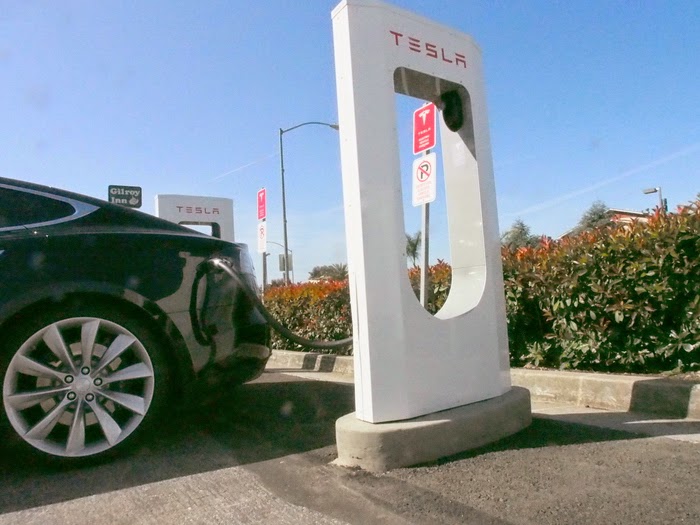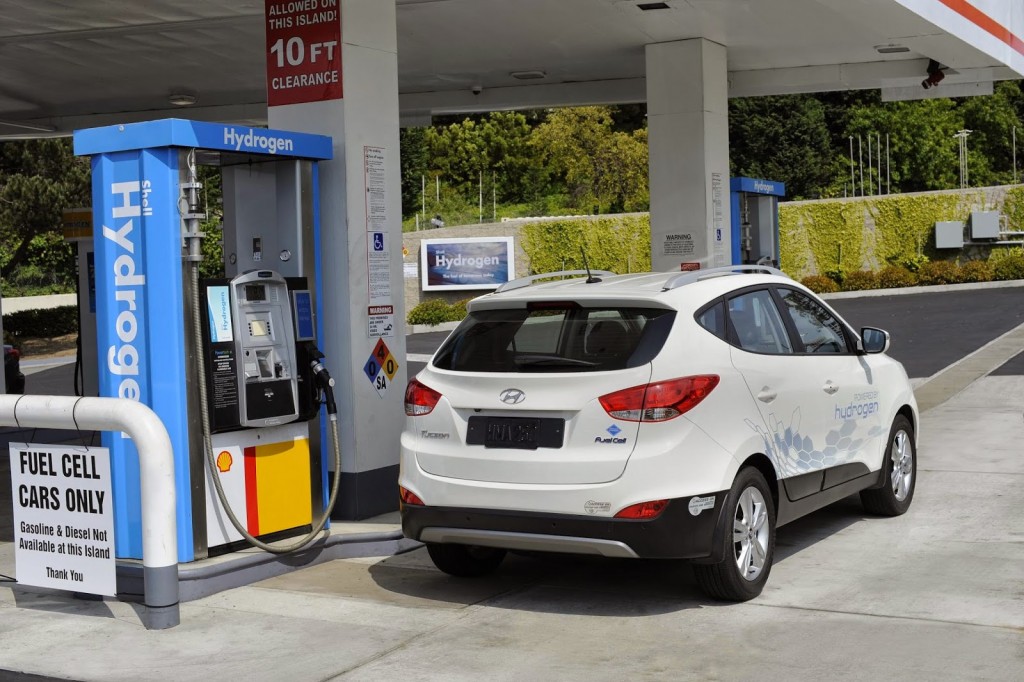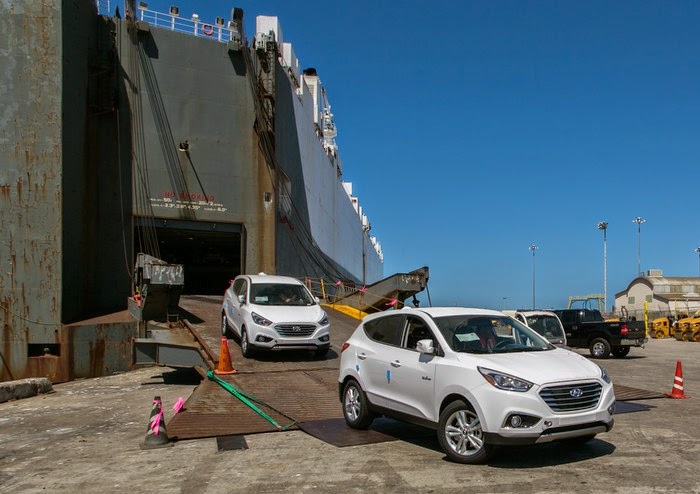Tesla Motors is angry this week at Hyundai making bogus political allegations about Tesla’s Supercharger network, and at the U.S. White House for passing the buck in dealing with the battle over Tesla’s direct car-sales model. On the one hand Hyundai is making yet another astonishingly bad statement, and on the other hand the White House doesn’t have the power to influence the car sales model since it is each individual state which sets car sales policy. Tesla Motors’ response in both cases was anger, and one wonders if Tesla is overreacting.
Hyundai causes our jaw to hit the floor with another crazy statement
In the case of Hyundai, John Voelcker (Green Car Reports) interviewed Michael O’Brien![]() , head of product planning for Hyundai North America, about the Fuel Cell version of the Hyundai Tuscon. During that interview O’Brien made a jaw-droppingly false statement about the funding of Tesla’s Supercharger network, while at the same time jaw-droppingly ignored an issue with funding the hydrogen refueling infrastructure required for Hyundai’s fuel cell vehicles.
, head of product planning for Hyundai North America, about the Fuel Cell version of the Hyundai Tuscon. During that interview O’Brien made a jaw-droppingly false statement about the funding of Tesla’s Supercharger network, while at the same time jaw-droppingly ignored an issue with funding the hydrogen refueling infrastructure required for Hyundai’s fuel cell vehicles.
What O’Brien said was Tesla’s Supercharger network was funded using public dollars, from the grants and loans given to Tesla by the U.S. Government. At the same time he said that Hyundai received no government grants for their fuel cell vehicles.
Pick your jaw up off the floor.
O’Brien was wrong on both counts – though, there may be ways to twist the story to fit his statement.
First, the grants and loans given to Tesla were entirely for building the factory in Fremont at which Tesla Motors is building the Model S, Model X, and the forthcoming Gen3 car. The biggest chunk of that were loans given through the Dept. of Energy, alongside loans given to companies like Nissan or General Motors for their own electrified vehicle projects. Tesla Motors has since paid back their entire loan, something no other company has done.
Tesla Motors has also received tax breaks from California for equipment purchases – the big machines in the factory were bought tax-free as a result. Not loans, but tax credits.
As I recall it, no loan or grant was made to Tesla for anything related to the Supercharger system.
What O’Connell refers to is the program in California to build a hydrogen refueling network ahead of “mass production” of fuel cell vehicles from several manufacturers. A program which Hyundai representatives recently openly admitted to manipulating for Hyundai’s gain.
 The truth? Tesla Motors hasn’t received loans or grants to cover development or buildout of the Supercharger network. Hyundai, and certain other automakers, are benefitting from taxpayer funded hydrogen refueling stations.
The truth? Tesla Motors hasn’t received loans or grants to cover development or buildout of the Supercharger network. Hyundai, and certain other automakers, are benefitting from taxpayer funded hydrogen refueling stations.Do I think I would be angry, if I were in Diarmud O’Connell’s shoes, that Hyundai claimed the opposite? You betcha.
White House passes the buck on Tesla’s battle over direct car sales
What the White House said is: “We believe in the goal of improving consumer choice for American families, including more vehicles that provide savings at the pump for consumers. However, we understand that pre-empting current state laws on direct-to-consumer auto sales would require an act of Congress.”
It means the Federal Government has limited power to influence State laws.
Diarmud O’Connell’s response? “Rather than seize an opportunity to promote innovation and support the first successful American car company to be started in more than a century, the White House issued a response that was even more timid than its rejection of a petition to begin construction of a Death Star. Instead of showing the sort of leadership exhibited by senior officials at the Federal Trade Commission who declared their support for consumer freedom of choice, the White House merely passed the buck to Congress and trumpeted its advances in promoting vehicle efficiency. Given the economic and environmental principles at stake, we would have hoped for stronger leadership and more action.”
- Highway design could decrease death and injury risk, if “we” chose smarter designs - March 28, 2015
- GM really did trademark “range anxiety”, only later to abandon that mark - March 25, 2015
- US Government releases new regulations on hydraulic fracturing, that some call “toothless” - March 20, 2015
- Tesla Motors magic pill to solve range anxiety doesn’t quite instill range confidence - March 19, 2015
- Update on Galena IL oil train – 21 cars involved, which were the supposedly safer CP1232 design - March 7, 2015
- Another oil bomb train – why are they shipping crude oil by train? – Symptoms of fossil fuel addiction - March 6, 2015
- Chevron relinquishes fracking in Romania, as part of broader pull-out from Eastern European fracking operations - February 22, 2015
- Answer anti- electric car articles with truth and pride – truth outshines all distortions - February 19, 2015
- Apple taking big risk on developing a car? Please, Apple, don’t go there! - February 16, 2015
- Toyota, Nissan, Honda working on Japanese fuel cell infrastructure for Japanese government - February 12, 2015















